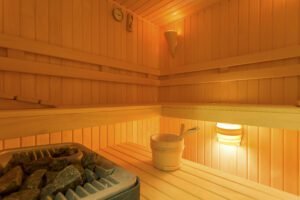Your home is there to keep you safe, protected against the elements, and healthy. While a lot of us focus on the first two, we may not often think about how we design and use our home, and how it impacts our long-term health. However, this becomes important, especially in winter, when bugs spread much more plentifully and the cold makes it a lot easier to get sick. Here’s how you can ensure that your home is taking better care of you and your family’s health.
The Importance Of Air Quality
During the winter, we often tend to seal ourselves up nice and tight, keeping the cold air from coming in and retaining as much warmth as we can. However, this can end up trapping allergies, dust, and other pollutants. This lack of air circulation can make the air dry and potentially dangerous for those with respiratory conditions like asthma or allergies. Running air purifiers, changing HVAC filters regularly, and introducing humidity control can help maintain healthier air quality. Even simple steps, like opening windows briefly on milder days, improve ventilation. The right plants can also act as natural air filters, adding oxygen and freshness.
Warmth Is Critical
Chillier days aren’t just more uncomfortable; they’re potentially more dangerous to your health, as well. Aside from increasing the risk of catching colds and flus, as your immune system gets weaker when your body is colder, the risks of conditions like hypothermia must be treated seriously, especially if there’s anyone with weakened immune function or who is a little older in the home. A well-functioning heating system is crucial for maintaining consistent warmth. Regularly servicing your boilers or furnace helps prevent breakdowns and ensures that your heating system stays efficient. While you should do what you can to preserve warmth through insulation, draft excluders, and the like, don’t skimp on the heating when you need it. Your health demands it.
Light And Mental Health
The change of the seasons can have just as much of an effect on our mental health as well as our physical health. As the days get shorter and the nights darker, the lack of light and vitamin D can affect our mood. Many people experience seasonal affective disorder, but even those who aren’t diagnosed can feel their mood dropping as it gets darker. Natural light plays the best role in regulating mental health and sleep, so keeping curtains open during the day and making sure furniture doesn’t block the window can be a good idea. Daylight lamps and light therapy boxes can be great for mimicking sunlight, too.
Germ Spread In The Home
While the germs that cause illness tend to come from outdoors, they can quickly spread through a home that isn’t kept clean. Regular cleaning and disinfecting routines during bug season can be vital. Pay extra attention to surfaces like countertops, doorknobs, and other shared spaces. Washing bedding more regularly in winter can also prevent germ spread.
With the tips above, you can ensure that your home is doing its part to protect and maintain your health, taking care of the issues that might risk it. This is especially important for anyone prone to getting sick in the winter.


































